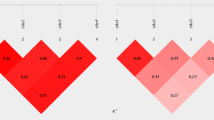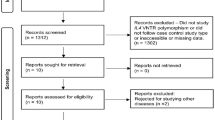Abstract
Rheumatoid arthritis (RA) is an autoinflammatory disease with a genetic background. The synoviocytes in RA shows cellular transformation with tumor-like features, and RA patients have genomic instability and relaxation of DNA repair mechanisms. The polymorphisms in BER repair pathway genes, XRCC1 and OGG1, may change the response to inflammation via altered DNA repair capacity. In this study, we aimed to investigate the relationship between the risk of RA and XRCC1 Arg194Trp, Arg399Gln, and OGG1 Ser326Cys polymorphisms in a group of Turkish RA patients. XRCC1 Arg194Trp, Arg399Gln, and OGG1 Ser326Cys polymorphisms were investigated by PCR–RFLP method in 100 RA patients and 158 healthy control subjects. The results were statistically analyzed by calculating the odds ratios (OR) and their 95% confidence intervals (95% CI) using the χ2-tests. RA patients in this study had significantly higher frequencies of XRCC1 Arg399Gln polymorphism in both homozygote (GG) (35%, OR: 7.78 [95% CI: 3.65–16.59], P < 0.001) and heterozygote (AG) forms (41%, OR: 2.17 [95% CI: 1.19–3.96], P < 0.01) and also increased frequency of 399Gln (G) allele (55%, OR:2.99 [95% CI: 1.67–5.37], P < 0.001). We conclude that XRCC1 Arg194Trp, and OGG1 Ser326Cys polymorphisms are not associated with RA; however, Arg399Gln polymorphism is a significant risk factor of RA, and carriers of 399Gln (G) allele have greater risk of RA.
Similar content being viewed by others
References
Orozco G, Rueda B, Martin J (2006) Genetic basis of rheumatoid arthritis. Biomed Pharmacother 60:656–662. doi:10.1016/j.biopha.2006.09.003
Hitchon CA, El-Gabalawy HS (2004) Oxidation in rheumatoid arthritis. Arthritis Res Ther 6:265–278. doi:10.1186/ar1447
Lee SH, Chang DK, Goel A, Boland CR, Bugbee W, Boyle DL, Firestein GS (2003) Microsatellite instability and suppressed DNA repair enzyme expression in rheumatoid arthritis. J Immunol 170:2214–2220
Raychaudhuri S (2010) Recent advances in the genetics of rheumatoid arthritis. Curr Opin Rheum 22:109–118. doi:10.1097/BOR.0b013e328336474d
Amouroux R, Campalans A, Epe B, Radicella JP (2010) Oxidative stress triggers the preferential assembly of base excision repair complexes on open chromatin regions. Nucleic Acids Res 38(9):2878–2890. doi:10.1093/nar/gkp1247
Mabley JG, Pacher P, Deb A, Wallace R, Elder RH, Szabo C (2005) Potential role for 8-oxoguanine DNA glycosylase in regulating inflammation. FASEB J 19(2):290–292. doi:10.1096/fj.04-2278fje
Marsin S, Vidal AE, Sossou M, Menissier-de Murcial J, Le Page F, Boiteux S, de Murcial G, Radicella JP (2003) Role of XRCC1 in the coordination and stimulation of oxidative DNA damage repair initiated by the DNA glycosylase hOGG1. J Biol Chem 278:44068–44074
Monaco R, Rosal R, Dolan MA, Pincus MR, Brandt-Rauf PW (2007) Conformational effects of a common codon 399 polymorphism on the BRCT1 domain of the XRCC1 protein. Protein J 26(8):541–546
Clarke A, Vyse TJ (2009) Genetics of rheumatic disease. Arthritis Res Ther 11(5):248. doi:10.1186/ar2781
Meira LB, Bugni JM, Green SL, Lee CW, Pang B, Borenshtein D, Rickman BH, Rogers AB, Moreski-Ergul CA, McFaline JL, Schauer DB, Dedon PC, Fox JG, Samson LD (2005) DNA damage induced by chronic inflammation contributes to colon carcinogenesis in mice. J Clin Invest 118(7):2516–2525. doi:10.1172/JCI35073
Koyama A, Kubota Y, Shimamura T, Horiuchi S (2006) Possible association of the X-ray cross complementing gene 1 (XRCC1) Arg280His polymorphism as a risk factor for rheumatoid arthritis. Rheumatol Int 26:749–751. doi:10.1007/s00296-005-0066-3
Hung RJ, Hall J, Brennan P, Boffetta P (2005) Genetic polymorphisms in the base excision repair pathway and cancer risk: a HuGE review. Am J Epidemiol 162(10):925–942. doi:10.1093/aje/kw/i318
Kocabas NA, Karahalil B (2006) XRCC1 Arg399Gln genetic polymorphism in a Turkish population. Int J Toxicol 25:419–422. doi:10.1080/10915810600870567
Kohno T, Shinmura K, Tosaka M, Tani M, Kim SR, Sugimura H, Nohmi T, Kasai H, Yokota J (1998) Genetic polymorphisms and alternative splicing of the hOGG1 gene, that is involved in the repair of 8-hydroxyguanine in damaged DNA. Oncogene 16:3219–3225
Lin YJ, Wan L, Huang CM, Chen SY, Huang YC, Lai CH, Lin WY, Liu HP, Wu YS, Chen CM, Tsai YH, Tsai CH, Sheu CCJ, Tsai FJ (2009) Polymorphisms in the DNA repair gene XRCC1 and associations with systemic lupus erythematosus risk in the Taiwanese Han Chinese population. Lupus 18:1246–1251. doi:10.1177/0961203309345777
Acknowledgments
We thank the patients and volunteers, who participated in this study. This study was not financially supported by any governmental or non-governmental funds, and the authors report no conflicts of interest.
Author information
Authors and Affiliations
Corresponding author
Author contributions
Author contributions
Each author in this paper contributed to various aspects of this study: Patient recruitment and clinical data collections by F. Karakurt, E. Cetin, and L. Ozgonenel, DNA isolation and genotyping performed by B. Batar, study designed by I. Onaran, M. Guven and G. Kanigur-Sultuybek, data interpretation and preparation of the manuscript performed by E. Yosunkaya.
Rights and permissions
About this article
Cite this article
Yosunkaya, E., Karakurt, F., Cetin, E. et al. Rheumatoid arthritis risk associates with DNA repair gene XRCC1 Arg399Gln polymorphism in Turkish patients. Rheumatol Int 32, 1265–1269 (2012). https://doi.org/10.1007/s00296-010-1725-6
Received:
Accepted:
Published:
Issue Date:
DOI: https://doi.org/10.1007/s00296-010-1725-6




